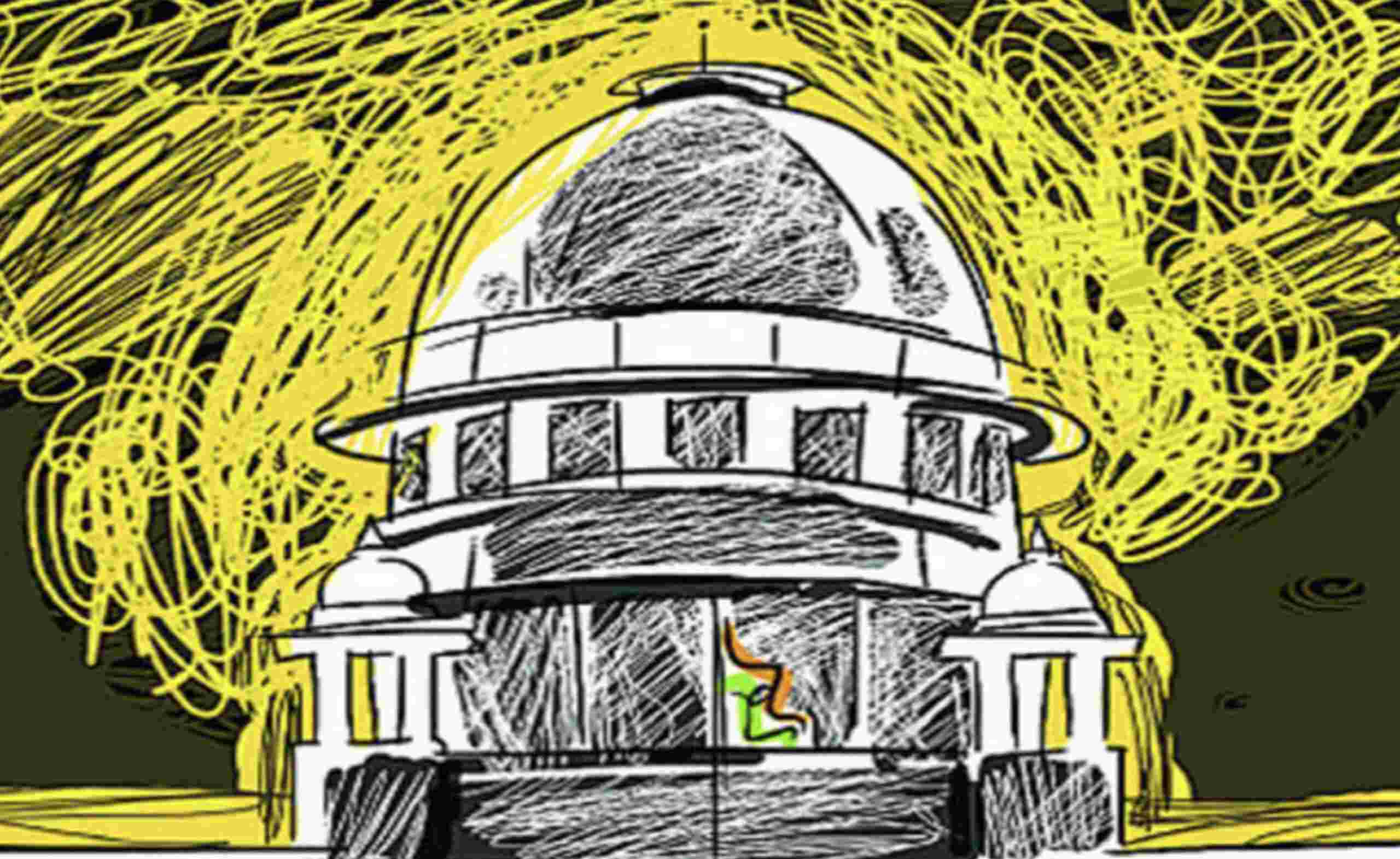
It’s a much maligned term in the context of the Indian judiciary and, therefore, needs a closer look.
I am not either a constitutional or legal expert to wholly or largely comprehend and analyse the the outermost boundaries of our legal system and determine the exact points where it interferes into the domain of either legislative or the executive of India.
However, as an ordinary citizen of India, who is affected by the decisions taken under the holy dome, as well as within the chilling chambers of Shastri Bhawan and within soon to be dismantled the so called temple of our democracy (?) , shall try to share my experience with you in this write up.
As such, judiciary is a system to play the arbitrator between two opposite sides, ensure justice to the aggrieved and, above all law creating body and law defining body according to the letter and spirit of the Constitution of India.
It’s the third dimension of the role of judiciary which attracts both my attention and analysis.
The Indian judiciary, barring a few exceptions, has an illustrious record of holding the Constitution and the rule of law in the country. The exceptions have been more common in the last six years of Modi government which is basically un democratic and a believer in concentration of power in the legislature, or, to put it bluntly, in the hands of the PM and HM . Incidentally, the political, moral and ethical credentials of both the gentlemen (?) are not above board.
Of late, under the Honourable Chief Justice of India, Mr. Ramana, the judiciary is trying desperately to regain its lost glory due to the compromises made by a couple of ex CJI’s to placate the un democratic and unconstitutional, and, in some cases like Ayodhya land dispute, even unlawful judgments causing a distrust in the minds of the ordinary citizens like me for the apex court.
The fresh tenor of judicial righteousness emanating from the recent observations, decisions and remarks by the apex court has its cascading effect on the lower courts too as evident in their stand taken against Delhi police in matters of Delhi genocide of the Muslims last year.
The lower courts have gone to the extent of imposing fines upon the erring police officers, thus , creating a history in upholding personal responsibility of a member of the executive for playing as a henchman of the powers that be to illegally confine, persecute and terrorise a section of the population. Many may call it an example of the judicial activism in today’s scenario, but the question still remains, did the courts really have an alternative choice?
The stand of the apex court regarding protection of the democratic rights to protest peacefully is often repeated and commendable, as well as its stand on the right to know the truth through a fair press .
However, the buck stops there. These decisions and observations flatter to deceive. In fact, our minds are so warped in dark hopelessness in the last six years of judicial illegalities that even a whiff of fresh air in these suffocating circumstances seems God sent.
In fact, the real questions lie beyond what is seen to be addressed at the moment. I have to make a passionate appeal to the Honourable CJI of India and the Honourable Supreme Court of India to take cognisance of the following ex judgments which have really murdered both the rule of law and the Constitution of India in the last few years.T
- The Honourable Court must review the Ayodhya judgment without prejudice to the so called public sentiment and settle the issue for ever as a title suit which it basically is . Even the truncated judgment upon the issue admits that the land belongs to the Babri Masjid trust and not the Ram Janmbhoomi Trust. You have only to delete the later part of the judgment my lord !
- The Honourable Court must bring in public domain the truth (?) hidden in the sealed envelope ✉️ regarding government’s submission about the Rafael deal, and bring crooks to book by trying them for treason, plunder of public money, clash of interests, crony capitalism and compromising national interests for personal gains. Since the Honourable Court is of the view that people in a democracy have a right to access to truth, re opening up of the Rafael case would make it walking its talk .
- The Honourable Court should also put in public the findings of the committee appointed by it to look into the legal and other merits of the Farmer’s law. The Honourable Court must take into account the circumstances and the procedures under which these contentious laws were passed in the Upper House on the 20th September last year. Mere allowing the farmers their right to protest is not enough.
- The Honourable Court must take cognisance of all the innocent activists rotting in the jails in the Bheema Koregaon case and release them with immediate effect to prevent any farther incarceration of the innocent by the brutal state machinery.
- The Honourable Court must release Sanjiv Bhatt on bail and act upon his evidence on the 2002 Gujarat riot case and bring the culprits to the gallows. Lip sympathy to justice doesn’t ensure justice my lord!
The list is unending and a detailed litany of judicial mishaps and slips will only lead to further distrust and dismay which is not the purpose of this humble petitioner.
To conclude, India is waiting anxiously for such type of judicial activism my lord to restore faith in democracy and its judiciary. Please don’t let people take to the streets for justice.
[ प्रतिभा एक डायरी स्वतंत्र ब्लाॅग है. इसे नियमित पढ़ने के लिए सब्सक्राईब करें. प्रकाशित ब्लाॅग पर आपकी प्रतिक्रिया अपेक्षित है. प्रतिभा एक डायरी से जुड़े अन्य अपडेट लगातार हासिल करने के लिए हमें फेसबुक और गूगल प्लस पर ज्वॉइन करें, ट्विटर हैण्डल पर फॉलो करे… एवं ‘मोबाईल एप ‘डाऊनलोड करें ]



